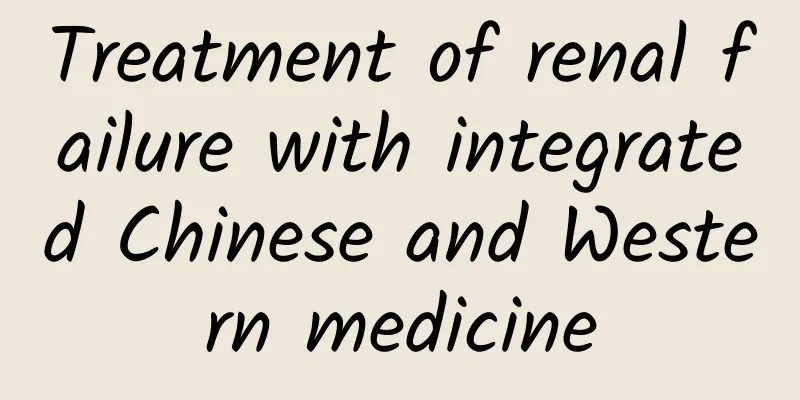Treatment of renal failure with integrated Chinese and Western medicine

|
Renal failure is a chronic and progressive renal parenchymal damage caused by a variety of factors, which causes the kidneys to atrophy and fail to maintain their original functions. The clinical manifestations are mainly water, electrolyte, and acid-base imbalances, and metabolic products are retained in the body. The disease will accumulate in various body systems, seriously affecting human life and health. There is currently no effective cure for renal failure in clinical practice, but most people believe that the onset of renal failure indicates the occurrence of uremia, but in fact not all renal failure will develop into uremia. Combined with the following article, we will popularize the advantages and effects of combining traditional Chinese and Western medicine to treat renal failure for your reference! 1. What symptoms should you be alert to in case of renal failure? The early symptoms of chronic renal failure are mainly excessive fatigue, back pain, loss of appetite, etc. Some patients with chronic renal failure may also have varying degrees of edema, which only appears on the face, eyelids, and loose tissues in mild cases, and can spread to the entire body in severe cases, and is prone to symptoms such as pleural effusion and ascites. Increased blood pressure is also a common symptom in patients with chronic renal failure, which is generally moderate. In addition, it should be noted that if there are a lot of bubbles in the urine, the color turns red or brown, and the number and amount of nocturia increase, you should also be alert in time (as shown in Figure 1). Figure 1 (Picture from the Internet) 2. What are the risk factors for continued progression of renal failure? 2.1 Risk factors for progressive development: uncontrolled hyperglycemia, proteinuria, hypertension, microalbuminuria, long-term smoking, hypoproteinemia, malnutrition, anemia, hyperlipidemia, phenolic uremic toxins, and parathyroid hormone all play an important role in the development of renal failure (Figure 2). Figure 2 (Picture from the Internet) 2.2 Risk factors for acute exacerbation: Renal failure can suddenly worsen at a certain stage, and even develop to the terminal stage, such as the anuria stage or failure stage, which can be life-threatening. Aggravating factors include various kidney-related diseases, such as hypertension, primary glomerulonephritis, ischemic nephropathy, diabetes, etc.; or insufficient blood volume can easily aggravate symptoms, such as severe dehydration, hypotension, heavy bleeding, shock, etc., which can lead to short-term acute kidney injury; the use of drugs that cause toxic damage to the kidneys, such as urinary tract obstruction, can lead to severe infection, severe sepsis and severe liver damage. 3. How to conduct early treatment of renal failure with Western medicine? Actively intervene in primary lesions, quickly correct reversible factors, rationally adjust dietary nutrition, strengthen physical exercise, improve bad living habits, control blood pressure, blood sugar, and blood lipid levels, maintain normal water and electrolyte balance on a daily basis, improve metabolic acidemia, actively prevent and treat renal anemia, treat renal osteodystrophy and abnormal calcium and phosphorus metabolism, and effectively prevent the occurrence of cardiovascular complications (as shown in Figure 3). Figure 3 (Picture from the Internet) 4. What are the advantages of traditional Chinese medicine in treating renal failure? Combined with the analysis of clinical related treatment results, the use of traditional Chinese medicine for chronic renal failure has many advantages. Its treatment methods are fast, convenient, effective, and inexpensive. The treatment methods are suitable for a variety of people and will not increase the treatment burden on the family. Chronic renal failure is in the early stages. Combining traditional Chinese medicine treatment with Western medicine can significantly improve the clinical treatment effect, quickly control the further development of the disease, and avoid the occurrence of uremia. It can be seen that traditional Chinese medicine has unique advantages in treating renal failure, but the combination of traditional Chinese and Western medicine can further improve the clinical treatment effect. 5. TCM treatment of renal failure 5.1 Syndrome differentiation and treatment ①Spleen and kidney qi deficiency syndrome: symptoms include sallow complexion, thin muscles, abdominal distension and pain, thirst, shortness of breath, loss of appetite, fatigue, back pain, edema, frequent urination at night, yellow urine, pale tongue coating, and thready and weak pulse. The treatment principle is to strengthen the spleen and tonify the kidney. Xiangsha Liujunzi Decoction can be used for treatment. The formula includes Atractylodes macrocephala, Astragalus membranaceus, Tangerine peel, Codonopsis pilosula, Achyranthes bidentata, Zhigancao, Pinellia ternata, Amomum villosum, Chinese yam, Poria cocos, Coix seeds, Aucklandia lappa, Dipsacus asper, Cuscuta chinensis, etc. If the qi deficiency is severe, ginseng can be added in appropriate amount for decoction. If the patient has poor appetite and eats less, charred hawthorn and stir-fried barley malt can be added in appropriate amount for decoction. If the patient is combined with dampness and turbidity, Pinellia ternata and Acorus calamus can be added in appropriate amount for decoction. If the patient is prone to cold symptoms, Yupingfeng Powder can be used appropriately for decoction to achieve the effect of invigorating qi and strengthening the exterior. Chinese patent medicine can also be selected, such as Nephritis Recovery Tablets (as shown in Figure 4). Figure 4 (Picture from the Internet) ②Spleen and kidney yang deficiency syndrome: symptoms include pale face, thin muscles, dull expression, cold limbs, cold waist and back, general fatigue, backache, chest tightness and weakness, dyspnea, loss of appetite, chest and abdominal distension, edema, dry and hard stools, clear and long urination at night, pale tongue with tooth marks, white fur, and weak pulse. The main treatment principle is to warm and tonify the spleen and kidney. The prescription Zhenwu Decoction can be used for treatment. The prescription includes Curculigo, Codonopsis, Cooked Aconite (needs to be decocted before use), Cinnamon, Poria, Epimedium, Areca, Astragalus, and White Atractylodes, Poria, and Rhubarb; if the patient has spleen yang deficiency or severe spleen and stomach deficiency and cold, add appropriate amount of dried ginger for decoction; if the patient has obvious edema or less urine, add appropriate amount of Alisma, Plantago, and Rhizoma Anemarrhenae for decoction; if the patient has dampness and turbidity, add appropriate amount of Pinellia and Acorus calamus for decoction; if severe abdominal distension and constipation occur, add appropriate amount of Citrus aurantium for decoction; if lack of appetite and loose stools occur, add appropriate amount of Psoralea corylifolia and Nutmeg at the same time; you can also take Chinese patent medicine, such as Nephritis Recovery Tablets. ③Syndrome of deficiency of both Qi and Yin: main symptoms include dizziness, sallow complexion, thin muscles, sore waist and back, abdominal distension, dry mouth, hot and dry mouth, loose stools, fatigue, insomnia, frequent dreams, clear and long urination at night, pale tongue with yellow fur, and thready and weak pulse; the main treatment principle is to invigorate Qi and nourish Yin; the prescription can be modified from Shenqi Dihuang Decoction; the prescription is composed of Schisandra chinensis, Codonopsis pilosula, Rehmannia glutinosa, Astragalus membranaceus, Ophiopogon japonicus, Tangerine peel, Poria cocos, Polygonatum sibiricum, Chinese yam, Paeonia suffruticosa, Lycium barbarum, Cornus officinalis, Angelica sinensis, and White Peony Root; if it is yang deficiency, cinnamon bark, aconite, mistletoe, and Cibotium barometz can be added in appropriate amounts and decocted at the same time; if the patient has the condition of yin deficiency and hyperactivity of fire, Yunu Decoction can be used with modifications, or Zhibai Dihuang Pills can be used with modifications according to the situation; if the patient has spleen failure to regulate blood, which leads to bloody stools, vomiting blood, purpura, etc., it is recommended to use Bletilla striata or Guipi Decoction with Panax notoginseng, or oral Yunnan Baiyao for combined treatment; Chinese patent medicine can be selected, such as Zhenqi Fuzheng Granules. 5.2 Multiple routes of medication: External application method: Apply Chinese medicine externally on fixed acupuncture points according to the patient's condition, and stimulate the acupuncture points to achieve therapeutic effects through the human skin. Fumigation and medicinal bath therapy: Fumigation and medicinal bath therapy can play a role in opening up the lung qi. After the skin absorbs the drug, it can regulate the local immune situation and promote the secretion of sweat glands, which is beneficial to the effective elimination of toxins and water in the body. It can also improve the systemic circulation and help the rapid recovery of kidney function, which can effectively treat renal failure. Common drugs include duckweed, ephedra, sophora flavescens, cinnamon twigs, etc. (as shown in Figure 5). Figure 5 (Picture from the Internet) Intravenous injection of traditional Chinese medicine: The intravenous injection of traditional Chinese medicine mainly draws on the intravenous injection of drugs to improve the microcirculation of the whole body. Commonly used drugs include ligustrazine injection, danshen injection, etc. Enema: Chinese medicine enema mainly uses the intestine as a semipermeable membrane to carry out "dialysis" treatment of the colon. Through ultrafiltration and diffusion of the intestine and other corresponding drug effects, various toxins in the blood are effectively removed, thereby achieving good therapeutic effects. Common enema drugs in clinical practice include prepared aconite, rhubarb, salvia miltiorrhiza, dandelion, safflower, oyster, etc. Summary: Both traditional Chinese medicine and Western medicine have unique advantages and characteristics in the treatment of renal failure, but the combination of traditional Chinese and Western medicine can significantly improve the clinical treatment effect. |
<<: Rotavirus, the culprit of diarrhea in infants and young children
>>: Why do children have food accumulation? What are the symptoms and hazards of food accumulation?
Recommend
What to eat during pregnancy
Women eat a lot of nutritious foods during pregna...
Reasons for chest tightness and shortness of breath in girls
In real life, you may occasionally experience che...
What is the most effective way to treat toothache during pregnancy?
Toothache is quite common in pregnant women. Ther...
White discharge with some green tofu residue
Every adult woman will have leucorrhea secreted e...
If you already have liver cirrhosis, can multidisciplinary diagnosis and treatment give you a new lease of life?
This is the 4785th article of Da Yi Xiao Hu On th...
Wearing high heels often can cause arthritis in old age
Women should try to avoid walking in pointed high...
Pharmacist's Antidote | How to use liver-protecting drugs correctly, you will understand after reading this article!
Regarding liver protection drugs, many people bel...
What are the symptoms of inflammation below?
Women will feel embarrassed when their lower body...
How to manage blood pressure scientifically? Self-management guide for patients with hypertension
Hypertension is called a "silent killer"...
How to steam crabs without fishy smell and make them delicious? How to preserve fresh crabs better
Crabs are rich in nutrients and contain a variety...
The chance of pregnancy during delayed menstruation
We all know that having sex after ovulation is li...
What is the cause of the lumps on the labia?
Maybe all female friends have had this experience...
Precautions for women to use moxibustion on the abdomen
We all know that the health care projects in beau...
The secret of domestic App Store ranking manipulation is revealed: paid rankings are cheaper than free rankings
In early March 2012 , Apple App Store changed its...
Relieve spleen and stomach deficiency! How does the lifestyle of young people affect your digestive system?
Spleen and stomach deficiency, the "invisibl...









